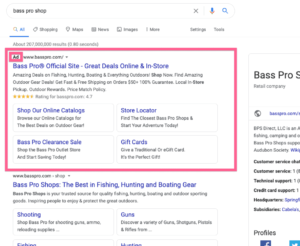What’s the difference between SEO and PPC?
Your website is all set up and running. You list your services, products, and all the reasons your potential customers should be using you over your competitors. You launch and wait, no one comes or the ones that do bounce off your page (or leave quickly without converting).
SEO (Search Engine Optimization)
The problem is probably with your SEO or search engine optimization. You need to let search engines know who you are, what you do, and do it in a way search engines can understand.
Things like Optimized Content, Proper Tags, Metadata, Schema Data, and Backlinks are important and having a good handle on what these are and how to use them, or hiring someone who does, is important. You may get lucky and Google will crawl your pages and rank your site at the top of search results. This is more likely if you are in a non-competitive niche, however for most of us, that is not going to happen without doing the work.
Google Ads and PPC
If you don’t know what Google Ads and PPC are, it’s how businesses advertise on Google, Facebook, Instagram, and other websites all over the internet who are paid by search engines and social media ad networks to display those ads. You probably see these ads every day and don’t even notice.
These ads can show on millions of websites and are a great way to target customers and potential leads who are either showing signs of being interested in your products and services or who have visited your site in the past (retargeting/remarketing).
Not only can your ads be customized to fit your needs and goals, but you can also track conversions and other metrics. This allows you to get a better picture of not only who is looking at your ads, but also what devices they are using, where they are, and if they are your intended audience.
There are many different types of ads to display on these networks and search engines. The majority of ads fall into three categories:
Display Ads: Visual banner ads that typically include an image and text that display in many different sizes. You’ll see these in your social media feeds, on the sidebar, and across the top of many websites. These ads are great for general promotion and retargeting customers who’ve visited your site in the past.
Search Ads: These are the ads that show on the top and bottom of search results and are a great way to get into the first three results of Google. These ads are great at targeting high intent customers who are actively searching for your products and services.

Video Ads: These ads show before and during videos on Youtube and social networks like Facebook. These ads are great at showing people what you do or speaking directly to your ideal customer. They have some of the same targeting options as other ad options and can be very effective.
PPC VS SEO
So what’s the difference and why are they both important?
Imagine your website is located in a city. Your “store (website)” is new to the neighborhood. No one really knows you, what you do, or if you are trustworthy. On top of that, you couldn’t afford prime real estate to the point that your store is 20 miles from town and there is only a single dirt road leading to it (and it’s hidden behind a tree). This is what it’s like for most new websites.
You can direct people to your store using traditional methods like calling them, posting about your store, emailing people, and word of mouth. But people are still going to have to do some searching to find you, because of the long drive and the bad road.
As you can see from this situation you would need to do serious work if you ever hoped to be successful. You would need some better roads, a closer location, a reputation, some advertising, etc. Your product may be really good, and the dirt road going by your shop may be enough that advertising will get customers in the door. However, as soon as the advertising stops most of the new customers stop as well. This is the picture of why SEO and PPC are both important.
PPC is kind of like sticking up a billboard in the middle of your “town (the internet)” and a flier in your potential customer’s pocket (in a non-creepy way). PPC will work as long as you can afford it and is probably going to work well if you invest enough time into learning what you’re doing (or hiring a company like Prairie Giraffe). However, as soon as you stop paying, the billboards and signs come down and the next person willing to buy those spots gets their ads put up. It’s the Pay-to-Play option. It gets people in the door and it does it well, but if PPC is your only strategy, you will pay forever.
SEO, on the other hand, is like building roads to your store, larger, faster, smoother than your dirt trail. Gaining trust from those in your “town” and a good reputation (Links and Domain Authority). The more search engines know who you are, what you do, that other people reference you, and that you are the most relevant result to fulfill their customer’s needs, you will get traffic and people coming to your store (website). The best part is once your SEO has been taken care of and is in good shape, you typically don’t have to pay as much to keep the momentum going.
Granted you should always be working on your SEO (creating content, building backlinks, optimizing your website), but unlike PPC, you don’t have to pay per click or impression and done right you will start gaining more and more organic traffic.
Both are important, but which one should I start with?
Short answer, Both!
You can get customers to your site using PPC advertising. But, your long-term strategy should include incorporating SEO best practices into your website from the beginning. Start including the right headers, alt tags on your images, metadata, and schema where applicable. Make sure your site is fast and works great on mobile devices. Start getting local citations with websites like Yelp, Angie’s list (if applicable), Google My Business, Apple Maps, etc. Use content marketing and blogging to show your audience and Google what you do and that you know what you’re talking about.
Look for opportunities to get links to your business. If you have a business where you are an authority on something, see if other complementary businesses would be open to guest blogging opportunities or linking to your site, products, or articles. Also if you aren’t already, start blogging for your own business website. Nothing tells search engines and audiences that you know what you are talking about better than actually talking about it.
Search engines are really good at reading text. They still struggle with images especially when you aren’t using alt tags. So writing about what you do, problems you solve, questions your customers may be asking you, how you do particular things is a great way to build trust with customers and reinforce your relevancy to search engines.
A word of caution. Don’t stuff keywords into your content. By keyword stuffing I mean don’t use the word just to use it. Use the keywords you want to rank for naturally. If reading your content out loud sounds off, or unnatural, re right it using synonyms or other related keywords. Search engines are really good at context and synonyms and are getting better and better at detecting articles that were written just to trick them into ranking the site. You will be penalized and that’s the opposite of what you’re trying to do.
Here’s an article all about keyword stuffing and why it’s a bad idea.
So now go start building those “roads” and authority today for the long term while getting customers to your site and coming back to your site with PPC.
If you need help getting started with any of the concepts we have talked about here, or if they sound great, but you just don’t have the time, feel free to reach out. We would love to help.


